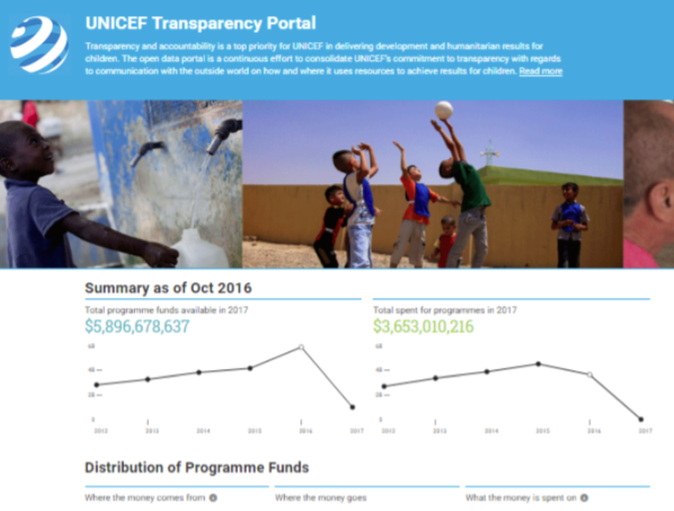|
IATI Data Converter; Open Data Portal; Results Assessment Module IATI Data Converter
Transparency and accountability is a top priority for UNICEF in delivering development and humanitarian results for children. A series of measures have been put in place to support this commitment, making information about funds spending easier to access, understand, and use and further enhancing on-going efforts to make the organization more efficient, responsive and collaborative. In March 2012, UNICEF signed up to the international Aid Transparency Initiative (IATI) and became the 29th signatory to the global multi-stakeholder initiative, which committed the organization to publicly disclose its information on aid spending and make it easier for all stakeholders to find, use and compare the data. Among the compliance requirements is the publishing of data on IATI’s Registry in a standard format (.XML) against an IATI schema comprising 39 indicators and according to that schema. The IATI Data Converter enables UNICEF to generate and publish monthly data files for 128 Country Offices, 7 Regional Offices and HQ Divisions (16 offices in one data file) starting end of February 2015. Open Data Transparency Portal The open data portal is a continuous effort to consolidate UNICEF’s commitment to transparency with regards to communication with the outside world on how and where it uses resources to achieve results for children. UNICEF has been pursuing a series of measures to support its transparency initiative, making information about program and operation performance as well as funds spending easier to access, understand, and use. This is in support of on-going efforts to make the agency more efficient, responsive, collaborative and better able to deliver on its commitments to children and to the principle of transparency. Results Assessment Module (RAM) UNICEF’s flagship performance management system (VISION/inSight) provides staff with programme and operations performance information through dashboards, management reports, data cubes and assessment modules such as the Results Assessment Module (RAM). RAM enables the entry of information on the status of results and related indicators at various levels.
0 Comments
Leave a Reply. |
AuthorWrite something about yourself. No need to be fancy, just an overview. Archives
June 2022
Categories |
Join the CSF data revolution webinar tomorrow!
COMMUNITY SYSTEMS FOUNDATION – EST 1963
+1 212 500 1335
data-driven sustainable development


 RSS Feed
RSS Feed